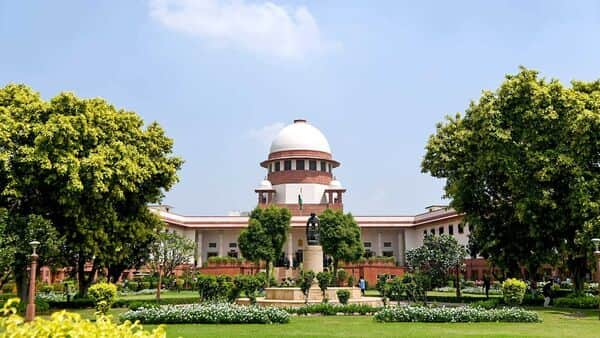(A) Constitution of India – Articles 14, 16, 32, 226 – Service Law – Estoppel – Participation in Recruitment Process – Minimum Marks for Viva Voce Exam – Selection Process for Judicial Officers – Shetty Commission Recommendations – The Supreme Court dealt with the maintainability of writ petitions challenging the recruitment process for judicial officers due to the inclusion of minimum marks for viva voce exams.
The Court held that even though participating in the process generally estops candidates from challenging it later, this principle doesn’t apply when there are glaring illegalities. Estoppel also cannot override fundamental rights violations.
The principle of res judicata was not applicable as different sets of petitioners raised additional contentions in this case.
The Court examined the recommendations of the Shetty Commission which aimed to reduce subjectivity and increase transparency in the selection process. While the Commission recommended no cut-off marks for viva voce, it also suggested a structured approach with evaluation through grades.
The Court found no inherent illegality in prescribing minimum marks for viva voce, especially considering the background of unguided viva voce being the sole selection method in some High Courts previously.
The Court also noted the potential advantage of urban, English-speaking candidates in the traditional viva voce system and highlighted the importance of creating a level playing field for diverse candidates. (Para 19, 23, 28-32)
(B) Constitution of India (Articles 14, 16) – Service Law – Minimum Marks for Viva Voce Exam – Recruitment of Judicial Officers – Shetty Commission Recommendations – This case dealt with the legality of minimum marks prescribed for viva voce exams in the recruitment process for judicial officers. The petitioners challenged the rule based on the recommendations of the Shetty Commission, which did not recommend minimum marks for viva voce.
The Court held that the All India Judges Association (2002) judgment did not address the issue of minimum marks for viva voce definitively.While the Shetty Commission recommendations are valuable guidelines, existing statutory rules for recruitment take precedence.
The Court distinguished prior cases (Hemani Malhotra, Ramesh Kumar) where rules were changed mid-process. Here, the minimum marks were notified before the process began.
The Court clarified that the All India Judges Association (2002) judgment allowed for “elbow room” to prescribe minimum marks. The Court found the minimum marks requirement for viva voce to be legal.(Para 34, 39, 43-45)
- Constitution of India – Articles 14, 16 – Service Law – Minimum Marks for Viva Voce Exam – Judicial Appointments – Non-arbitrariness under Article 14 – Interview as a Test for Suitability – This case examines the legality of minimum marks prescribed for viva voce exams in the recruitment process for judicial officers.
The question is whether such a requirement violates Articles 14 and 16 of the Constitution, which prohibit discrimination and guarantee equality before the law. Held: No.
The Court distinguishes between written exams and viva voce, acknowledging the latter’s role in assessing personal qualities relevant for judicial roles. Precedents are cited where weightage given to viva voce was a concern, but reasonable minimum marks were considered acceptable. The Court emphasizes the importance of viva voce in assessing a candidate’s suitability for judicial office, including factors like mental alertness, communication skills, and character. The minimum marks prescribed (20% for Bihar, 40% for Gujarat) are not considered excessively high in the context of judicial recruitment.
The Court differentiates this case from one where minimum marks were introduced mid-process, violating legitimate expectations. Here, the cut-off was announced beforehand. -Minimum marks requirement is not unconstitutional and no violation of legitimate expectations. (Para 52, 55, 56, 60, 67, 68)
(D) Constitution of India – Article 234, Article 320 – Service Law – Moderation of marks – Selection process for judicial appointments – Selection process for judicial appointments in Bihar and Gujarat. The High Courts in both states moderated the written exam marks to allow more candidates to qualify for the interview. The petitioners argued that this was not permitted by the relevant rules.
The Court held that moderation of marks was permissible under the relevant rules and did not vitiate the selection process. The Court cited previous judgements which allowed for moderation as a way to address discrepancies in marking. (Para 74)
(E) Constitution of India – Article 234, Article 320 – Service Law – Consultation with Public Service Commission – The petitioners in Gujarat challenged the selection process because the amended rules introducing minimum qualifying marks for the viva voce exam were not framed in consultation with the Gujarat Public Service Commission (PSC).
The Court held that consultation with the PSC is not mandatory under Article 234 of the Constitution if the PSC itself does not wish to be consulted. The Court noted that the Gujarat PSC had requested to be exempted from consultation for the post of Civil Judge.
The Court upheld the selection process for judicial appointments in both Bihar and Gujarat. The Court found that the moderation of marks did not violate the relevant laws. (Para 86, 91)
SUPREME COURT OF INDIA
2024 STPL(Web) 330 SC
[2024 INSC 381]
Abhimeet Sinha & Ors. Vs. High Court Of Judicature At Patna & Ors.
Writ Petition (C) No.251 of 2016 With writ Petition (C) No.663 of 2021,Writ Petition (C) No.735 of 2021,Writ Petition (C) No.1073 of 2022,Writ Petition (C) No.1146 of 2022 And Writ Petition (C) No.785 of 2023-Decided on 06-05-2024
https://stpllaw.in/wp-content/uploads/2024/05/2024-STPLWeb-330-SC.pdf







